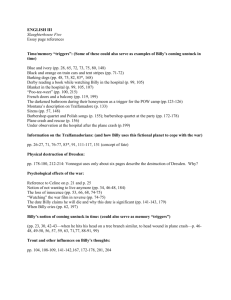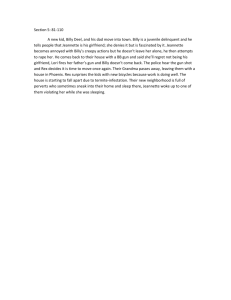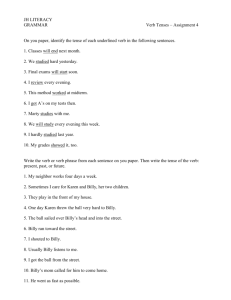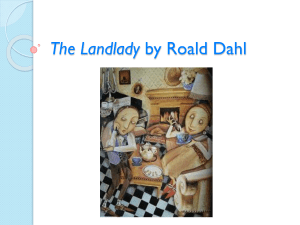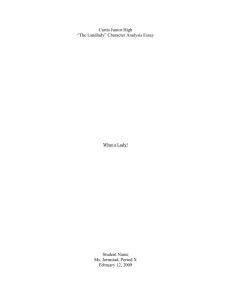working with short stories for adult language learners in
advertisement
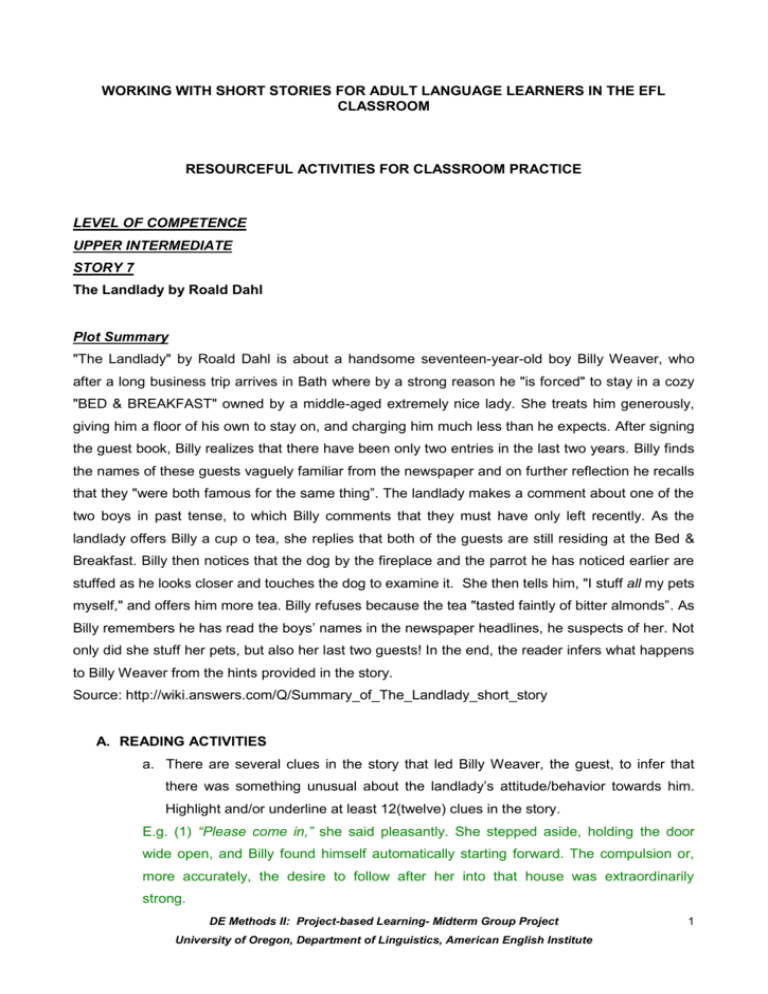
WORKING WITH SHORT STORIES FOR ADULT LANGUAGE LEARNERS IN THE EFL CLASSROOM RESOURCEFUL ACTIVITIES FOR CLASSROOM PRACTICE LEVEL OF COMPETENCE UPPER INTERMEDIATE STORY 7 The Landlady by Roald Dahl Plot Summary "The Landlady" by Roald Dahl is about a handsome seventeen-year-old boy Billy Weaver, who after a long business trip arrives in Bath where by a strong reason he "is forced" to stay in a cozy "BED & BREAKFAST" owned by a middle-aged extremely nice lady. She treats him generously, giving him a floor of his own to stay on, and charging him much less than he expects. After signing the guest book, Billy realizes that there have been only two entries in the last two years. Billy finds the names of these guests vaguely familiar from the newspaper and on further reflection he recalls that they "were both famous for the same thing”. The landlady makes a comment about one of the two boys in past tense, to which Billy comments that they must have only left recently. As the landlady offers Billy a cup o tea, she replies that both of the guests are still residing at the Bed & Breakfast. Billy then notices that the dog by the fireplace and the parrot he has noticed earlier are stuffed as he looks closer and touches the dog to examine it. She then tells him, "I stuff all my pets myself," and offers him more tea. Billy refuses because the tea "tasted faintly of bitter almonds”. As Billy remembers he has read the boys’ names in the newspaper headlines, he suspects of her. Not only did she stuff her pets, but also her last two guests! In the end, the reader infers what happens to Billy Weaver from the hints provided in the story. Source: http://wiki.answers.com/Q/Summary_of_The_Landlady_short_story A. READING ACTIVITIES a. There are several clues in the story that led Billy Weaver, the guest, to infer that there was something unusual about the landlady’s attitude/behavior towards him. Highlight and/or underline at least 12(twelve) clues in the story. E.g. (1) “Please come in,” she said pleasantly. She stepped aside, holding the door wide open, and Billy found himself automatically starting forward. The compulsion or, more accurately, the desire to follow after her into that house was extraordinarily strong. DE Methods II: Project-based Learning- Midterm Group Project University of Oregon, Department of Linguistics, American English Institute 1 “I saw the notice in the window,” he said, holding himself back. “Yes, I know.” (2) “I was wondering about a room.” “It’s all ready for you, my dear,” (3) she said. She had a round pink face and very gentle blue eyes. b. Reading Comprehension: Answer the following questions on the plot. Discuss them with a partner 1. What did Billy Weaver do for a living? Why had he travelled to Bath? Had he ever been there before? 2. Who did Billy work for? Where? 3. What was the Bell and Dragon? How did he get to know about it? How far was it from the railway station? 4. What did Billy Weaver suddenly catch sight of? What did it read? What was there underneath it? What did Billy do soon after? What did he see inside the B & B? 5. What made Billy think this boarding house might be a good place to stay in? 6. Why was Billy a tiny bit frightened of boarding houses? 7. What did Billy decide he would do before making a final decision? 8. What happened to him just then? How did he feel? What did he feel compelled to do? What did Billy Weaver find simply irresistible? 9. What was so strange about the door swinging open? 10. What was the lady like? What did Billy think about her? What did he like and dislike about her? 11. How much did she charge? How did Billy like it? Why? 12. What was the lady ready to do for fear Billy would find her place was too expensive? 13. What was Billy’s room like? What had the landlady put between the sheets? What for? What did she say he could do if he felt chilly? 14. What did Billy immediately notice in the room? Why did he find it quite peculiar? 15. What did the landlady ask him to, please, do before going to bed? 16. How can the lady’s words ‘...at this stage in the proceedings,...’ be paraphrased? 17. How did Billy justify the landlady’s strange attitudes? 18. How many entries were there in the guest-book? 19. What did Billy find funny when he signed the guest-book? 20. Where did the landlady say the two guests were? 21. What was there in common between the two guests in the book and Billy Weaver? 22. What might be Billy Weaver’s fate? DE Methods II: Project-based Learning- Midterm Group Project University of Oregon, Department of Linguistics, American English Institute 2 B. WRITING ACTIVITITES a. Write a descriptive paragraph answering the following questions. Imagine you're the landlady. You visit a friend of yours in London. How would you describe Billy Weaver, your last guest, so that a reader would have a clear portrayal of him? What was the first impression you got of him? What did he look like? What were his tastes and interests? What aspects of his personality did you discover? What did he do for a living? What you liked the most/least about him? b. Letter Writing Let’s imagine a different ending to the story. You are Billy Weaver and you are staying at the Bed & Breakfast in Bath. Soon after the nice lady offers you a cup of tea, you decide to go up to bed since your feel exhausted after the long trip. Once in your bedroom, you make up your mind to write a letter to a friend or relative expressing your growing concern that something is not right with the landlady. In your letter refer to at least five clues which make you not only suspect of the landlady’s strange behavior but also feel uncomfortable about staying there. Do not change the plot of the story and show your worry about the landlady’s weird attitude. You can start like this: Dear Julie, You’ll never imagine what happened to me when I looked for lodging in a boarding-house in Bath! Everything made me believe that the landlady was absolutely harmless but I had many reasons to believe she’s a little dotty. c. Connect the following ideas. Make all the necessary changes. The resulting statements should be true to fact according to the text. 1. Billy meant to stay in the hotel he had been recommended. Billy Weaver was mysteriously attracted to the Bed & Breakfast. Billy Weaver changed his mind. 2. Billy Weaver rang the doorbell. The door swung open. 3. The landlady resembled a friend’s mother. The landlady was somehow scary. 4. The pretty little dachshund seemed to be asleep. The dachshund was stuffed. 5. Billy Weaver thought he was a lucky fellow. Billy Weaver felt comfortable and cared for at the B & B. The cup of tea the landlady offered him smelled of bitter almonds. DE Methods II: Project-based Learning- Midterm Group Project University of Oregon, Department of Linguistics, American English Institute 3 C. SPEAKING ACTIVITY a. Work in pairs and do the following Read these proverbs. Explain the meaning of each of them. How could you connect them with the story? Which one fits better to each character? Why? Give good reasons and find evidence in the text to support your answer. Can you think of proverbs in your own language which have a similar meaning? Which ones? PROVERBS Never judge a book by its cover Doubt is the beginning of wisdom Curiosity killed the cat He who hesitates is lost b. Describing characters Students build vocabulary domains about different aspects of the main character(s), Billy Weaver and The Landlady; or about the same character in different moments of the story. Students are asked to write as many adjectives/adverbs/verbs as apply to the characters in the pictures: … what the …the …the character character’s character’s looks like behavior feelings ………………… ……………… ………………… ………………… ……………… ………………… …… ………… ………… Then, compare your chart with your partner’s and talk about it! DE Methods II: Project-based Learning- Midterm Group Project University of Oregon, Department of Linguistics, American English Institute 4 D. FILM ACTIVITY a. Click the following link http://www.youtube.com/watch?v=fEz39MfsLXQ and watch the video “The Landlady”. Then, complete the following chart about the similarities and differences between the film and the short story. Then, discuss your table with your partner’s. Differences Similarities 1. In the short story Billy gets 1. In the film and the short to know about a hotel, the story Billy catches sight of Bell and Dragon through a the sing B & B and he porter at the railways station immediately and he finds the B & B on attracted to spend the his way to the hotel; while in night there. the film he gets to know feels 2. …………………………… about the B & B through a …………… parson Billy met on the train to Bath. 2. ……………………………… ………… b. Freeze-framing activity The teacher stops a picture of the film, using the freeze frame or pause. After students see the section (e.g. the time Billy Weaver made up his mind to stay in the B & B), they will be using memory to reproduce either what is being said, or to describe what is happening, or what has just happened. c. Description Students work in pairs. One student in each pair turns their back to the screen. The other student faces the screen, and the video is played silently. The students who can see the screen describes what they can see to their partner. Both students will wish to hear the dialogue later. The "passive" student in each pair will be motivated to see what they have missed as well. It is worth that students swap roles. DE Methods II: Project-based Learning- Midterm Group Project University of Oregon, Department of Linguistics, American English Institute 5

